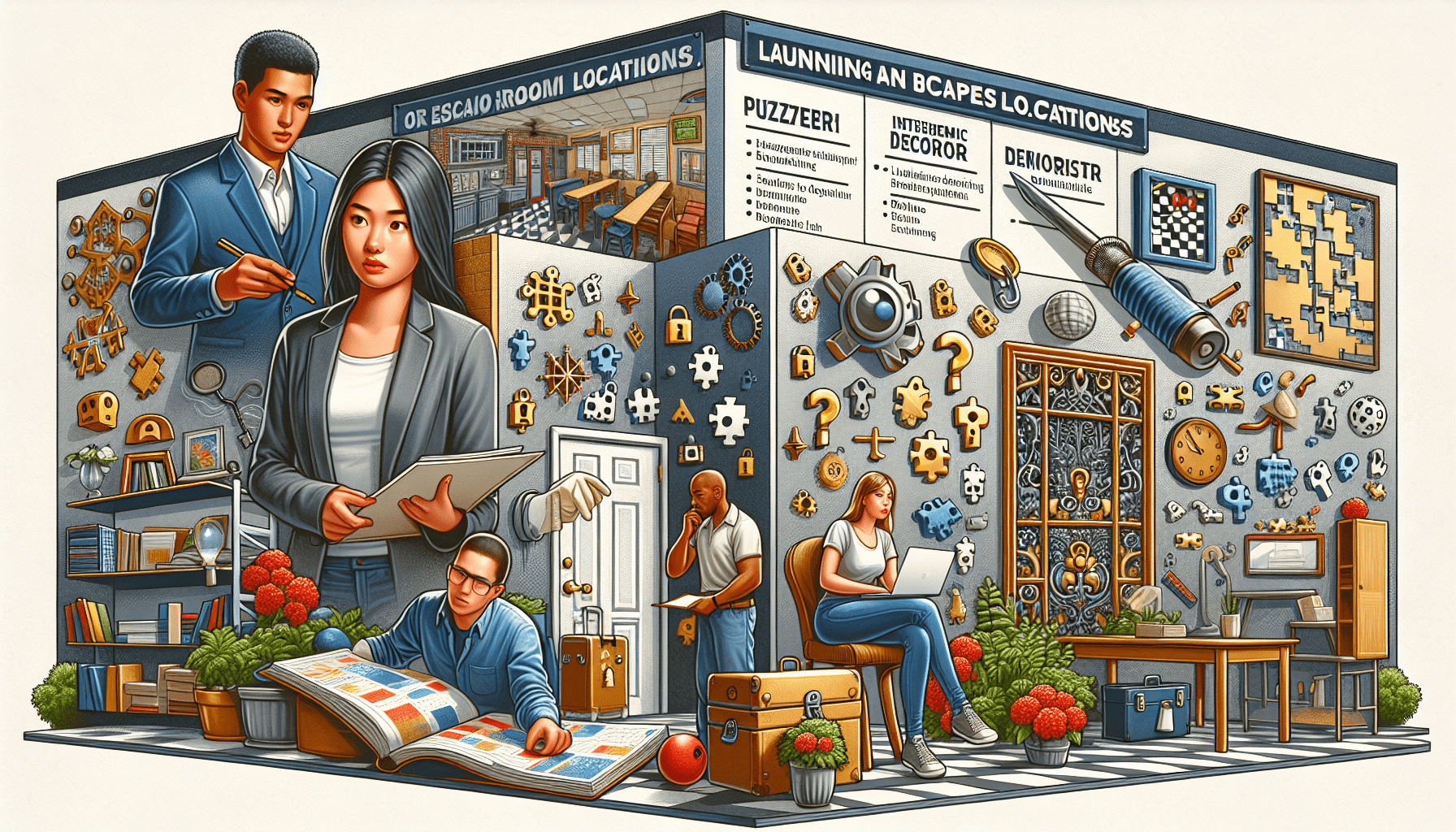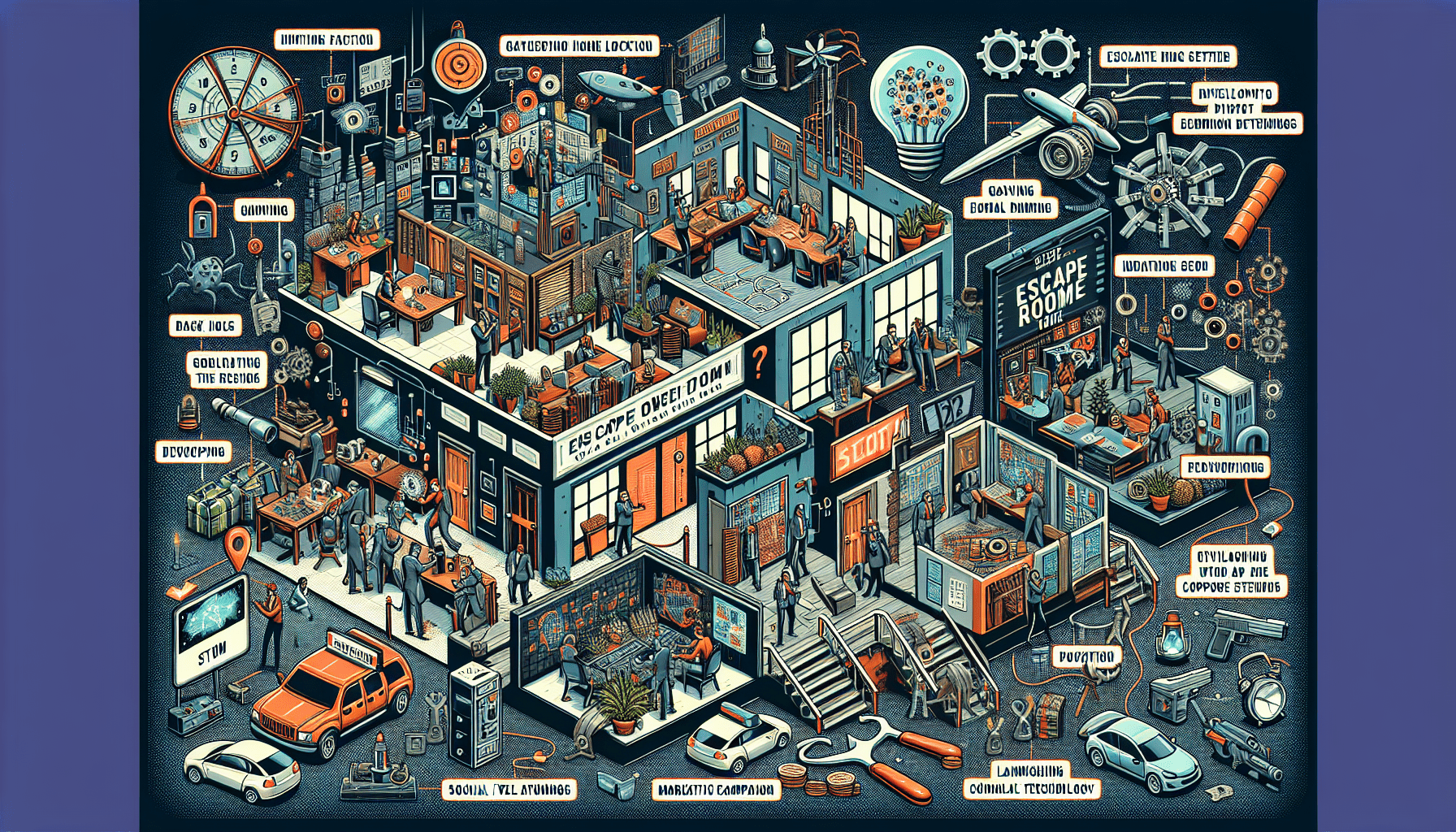Imagine embarking on a thrilling adventure where you and your friends race against the clock to solve puzzles, decode clues, and unlock secrets in order to escape from a locked room. Exciting, right? But have you ever wondered how much it takes to bring this immersive experience to life? Starting an escape room may seem like an overwhelming task, but fear not, because in this article, we will explore the costs involved in launching your very own escape room and provide you with a comprehensive guide to help you turn your dream into a reality. So, get ready to unlock the secrets of starting an escape room and get one step closer to creating an unforgettable and captivating experience for your future players.
Creating the Concept

Decide on the Theme and Storyline
When creating an escape room, the first step is to decide on the theme and storyline. This is what will engage your players and make your room unique. Consider different themes, such as a haunted mansion, a spy mission, or a futuristic spaceship. Think about what interests you and what you believe will captivate your target audience.
Once you have decided on the theme, it’s time to develop the storyline. This will provide the context and purpose for your players’ mission. It can be based on a mystery, a perilous adventure, or a race against time. The more immersive and compelling the storyline, the more memorable the experience will be for your players.
Design Challenges and Puzzles
The heart of any escape room is the design challenges and puzzles that players must solve to escape. These should be engaging, diverse, and tailored to the theme and storyline. Consider a mix of logical, physical, and skill-based challenges to cater to different types of players.
To create effective puzzles, brainstorm ideas and create a flowchart of how they will be interconnected. Think about the difficulty level and provide clues to ensure players don’t get stuck for too long. It’s essential to playtest your room with a diverse group of people to gather feedback and make necessary adjustments.
Remember that the success of your escape room will depend on the quality of the challenges and puzzles, so investing time and effort into this aspect is crucial.
Location and Space
Leasing or Buying a Property
Once you have a clear concept for your escape room, you need to find a suitable location. Consider whether you want to lease or buy a property. Leasing gives you flexibility and lower upfront costs, while buying provides long-term stability and the freedom to modify the space to your requirements.
Look for locations with good foot traffic and easy accessibility. Depending on the size of your room, you may need anywhere from 500 to 2,500 square feet of space. Factor in parking availability and the potential for expansion if your business grows.
Ensure you understand the lease or purchase terms thoroughly and consider consulting with a real estate professional to make an informed decision.
Size and Layout Considerations
When choosing a space for your escape room, it’s important to consider the size and layout. Each room should be spacious enough to accommodate a group of players comfortably. Also, factor in space for the control room or monitoring area where the game master will oversee the game.
The layout of the rooms should align with the storyline and allow for smooth player progression. Think about the flow of the game and ensure that players can move around without feeling cramped or restricted.
It’s recommended to work with an architect or interior designer to optimize the use of space and create an immersive environment that enhances the overall experience.
Renovation and Decoration Costs
Once you have secured a location, you may need to invest in renovations and decorations to bring your escape room concept to life. This can include building walls, installing doors, creating themed props and environments, and implementing special effects.
The cost of renovations and decorations will vary depending on the complexity of your concept and the condition of the space you have leased or purchased. It’s best to obtain multiple quotes from contractors and suppliers to compare prices and ensure you stay within budget.
Consider consulting with designers or scenic artists who specialize in escape room creation to help you bring your vision to reality while minimizing costs.
Equipment and Supplies
Escape Room Kits and Props
To create an immersive experience, you will need a variety of escape room kits and props. These can range from basic locks and puzzles to automated mechanisms and high-tech gadgets.
Start by making a list of all the necessary props and equipment based on your theme and puzzles. Look for reliable suppliers that offer high-quality products and consider bundling kits to save costs. Additionally, you may want to include contingency plans and backup props to avoid downtime in case of equipment failure.
Regularly update and expand your collection of kits and props to keep your puzzles fresh and exciting for returning players.

Audio and Visual Equipment
Sound and visuals play a significant role in enhancing the immersive experience of an escape room. Invest in good-quality speakers and audio equipment to create an atmosphere that aligns with your theme and storyline. You can use background music, sound effects, and recorded messages to guide and immerse players throughout the game.
In terms of visual equipment, consider using projectors, TVs, or monitors to display relevant information or videos. This can help provide clues or progress the storyline.
Both audio and visual equipment should be durable and easy to maintain. It’s recommended to consult with professionals specializing in audiovisual installations to ensure optimal performance and longevity.
Locks and Security Systems
Escape rooms often rely on locks and security systems to create challenges and puzzles for players. Invest in a variety of locks, such as combination locks, padlocks, and electronic locks, to provide a diverse range of obstacles. Make sure to choose locks that are reliable, durable, and easy to reset.
For added security and convenience, you may also consider installing a surveillance system to monitor the rooms and ensure the safety of players and your property. Consult with security experts to choose the appropriate system for your needs.
Remember to regularly test and maintain all locks and security systems to ensure they function properly and provide a seamless experience for your players.
Furniture and Fixtures
In addition to the specific equipment and props for your escape room, you’ll also need furniture and fixtures to create a comfortable and functional space. This can include seating areas for players before and after the game, storage solutions for your kits and props, and a control room setup for the game master.
Consider the durability and practicality of the furniture and fixtures, as they will be subjected to frequent use and wear. Choose materials that are easy to clean and maintain, as well as design elements that align with your theme.
It’s best to invest in high-quality furniture and fixtures from reputable suppliers to ensure longevity and customer satisfaction.
Technology and Software

Escape Room Management Software
To streamline your operations and enhance the overall experience, investing in escape room management software is highly recommended. This type of software can help you manage bookings, track inventory, create and manage puzzles, and analyze player data.
Look for software that offers a user-friendly interface and robust features that align with your business needs. Prioritize systems that allow easy integration with other technologies and provide regular updates and customer support.
While this software comes with a cost, it can significantly improve your efficiency and provide valuable insights into your business performance.
Reservation and Booking System
Managing reservations and bookings effectively is crucial to the success of your escape room business. Invest in a reliable reservation and booking system that is user-friendly for both your staff and customers.
Look for a system that allows customers to easily view availability, book time slots, and make payments online. It should also provide your staff with real-time updates, automate reminders, and generate reports for analysis and forecasting.
Consider the scalability of the system to accommodate potential growth in your business. Research different options and choose a system that best fits your needs and budget.
Audio and Video Integration
As previously mentioned, audio and video integration is essential in creating an immersive escape room experience. Invest in technology that seamlessly integrates audio and video components, allowing you to control and synchronize different elements throughout the game.
This integration can enhance the storyline, provide clues, and immerse players in the environment. Consider using automation systems that allow you to pre-program specific cues and timings to ensure a seamless experience for players.
Consult with experts in audiovisual integration to help you select the appropriate technology and ensure a reliable and synchronized operation.

Security and Monitoring
The safety and security of your players should always be a top priority. Invest in security and monitoring technology to ensure a safe environment for everyone.
Install security cameras in various locations, including the waiting area and game rooms, to monitor player activity. Consider integrating these cameras with your reservation and booking system to easily identify and validate players.
Additionally, have emergency protocols in place and consider investing in safety equipment, such as fire extinguishers and emergency exits.
Consult with security experts to assess your specific needs and implement the appropriate security and monitoring solutions.
Marketing and Promotion
Website Development and Hosting
To effectively market your escape room business, you’ll need a professional website that showcases your concept, highlights your unique selling points, and allows customers to easily make reservations.
Invest in web development to create an engaging and user-friendly website. Consider hiring a professional designer to ensure a visually appealing and easily navigable layout. Remember to optimize your website for search engines to improve visibility in online searches.
Host your website on a reliable server to ensure stability and fast loading times. Select a hosting plan that accommodates your expected web traffic and provides regular backups to avoid data loss.
Social Media and Digital Marketing
In today’s digital age, social media and digital marketing are essential in promoting your escape room business. Create accounts on popular social media platforms, such as Facebook, Instagram, and Twitter, to engage with potential customers and share updates, behind-the-scenes content, and special promotions.
Develop a digital marketing strategy that includes targeted advertising, search engine optimization, and content marketing. Consider allocating a budget for online ads on platforms like Google Ads and Facebook Ads to reach a wider audience.
Regularly update your social media profiles and website with fresh content to maintain engagement, and actively respond to customer inquiries and reviews.

Offline Advertising and PR Expenses
While digital marketing is crucial, don’t overlook offline advertising and public relations (PR) opportunities. Consider printing promotional materials, such as flyers, posters, and business cards, and distribute them in local establishments, community centers, and tourist information centers.
Invest in press releases and media outreach to generate buzz about your escape room. Collaborate with local influencers or bloggers to create content and share their experiences. Consider hosting special events or partnerships with other businesses to attract new customers.
Allocate a budget for offline advertising and PR expenses and continuously evaluate their effectiveness to ensure you are maximizing your return on investment.
Staffing and Training
Costs of Hiring and Training Game Masters
To provide a high-quality escape room experience, you’ll need skilled and knowledgeable game masters to guide players. Consider the costs of hiring and training these staff members in your financial projections.
When hiring game masters, prioritize qualities such as excellent communication skills, quick thinking, and the ability to handle stressful situations. Develop comprehensive training programs to ensure they are familiar with all aspects of the escape room and can effectively manage different player dynamics.
Consider offering competitive wages and incentives to attract and retain skilled game masters. Investing in their training and development will help maintain consistency and ensure customer satisfaction.
Employee Benefits and Insurance
In addition to wages, it’s important to consider employee benefits and insurance costs in your operational expenses. Explore different benefit options, such as healthcare, retirement plans, and paid time off, to attract and retain employees.
Additionally, make sure to invest in workers’ compensation and liability insurance to protect your staff and business in case of accidents or incidents. Consult with insurance professionals to assess the specific risks in your escape room and determine the appropriate coverage.
Remember to regularly review and update employee benefits and insurance policies to ensure they align with legal requirements and industry standards.
Legal and Licensing
Business Registration and Permits
Starting an escape room business involves various legal processes and permits. Consult with a lawyer or a business advisor to ensure you fulfill all legal requirements in your jurisdiction.
Register your business with the appropriate government agencies and obtain the necessary licenses to operate an entertainment facility. Research local regulations regarding fire safety, health inspections, and zoning requirements to ensure compliance.
Consider trademarking your business name, logo, and any unique intellectual property to protect your brand and prevent potential infringement.
Intellectual Property Rights
When developing your escape room concept, ensure that you are not infringing on any existing intellectual property rights. Create original themes, storylines, and puzzles to avoid legal complications.
If you plan to use any licensed material or references in your escape room, obtain the necessary permissions and licenses to avoid copyright infringement. Research the specific legal requirements and consult legal professionals if needed.
Protect your own intellectual property by applying for patents or copyrights for any unique props, mechanisms, or technologies you develop.
Liability Insurance
Operating an escape room involves inherent risks, such as accidents or injuries to players. To protect yourself and your business from potential claims and lawsuits, it’s crucial to obtain liability insurance.
Liability insurance can cover legal fees, medical expenses, and damages in case of accidents or injuries on your premises. Consult with insurance providers specializing in the entertainment industry to determine the appropriate coverage limits based on your specific risks and needs.
Regularly review your insurance policies to ensure they are up to date and provide adequate protection for your escape room business.
Operational Costs
Utilities (Electricity, Water, etc.)
Operating an escape room requires utilities such as electricity, water, and potentially gas. Contact local utility providers to estimate the costs of these services and include them in your operational expenses.
To minimize electricity costs, consider using energy-efficient lighting and equipment. Implement water-saving measures, such as low-flow toilets and faucets, to reduce water consumption.
Regularly monitor your utility usage and explore ways to optimize efficiency and reduce costs. Implementing smart systems that automatically adjust lighting and temperature settings can help save energy and reduce expenses.
Maintenance and Repairs
As with any facility, your escape room will require regular maintenance and occasional repairs. Set aside a budget for routine maintenance, such as cleaning, painting, and replacing worn-out props or furniture.
Identify any potential weak points in your rooms or equipment and conduct regular inspections to prevent potential issues. Develop a maintenance schedule and keep detailed records of all maintenance activities.
When repairs are necessary, promptly address them to minimize downtime and ensure a smooth experience for players. Establish relationships with reliable contractors and suppliers to quickly resolve any issues that may arise.
Supplies and Consumables
To keep your escape room operational, you will need various supplies and consumables. This includes items such as batteries, replacement locks, stationary, cleaning supplies, and game materials.
Keep track of your inventory and regularly restock essential supplies to avoid disruptions in gameplay. Consider buying in bulk to take advantage of discounts and reduce costs.
Maintain a detailed inventory management system to ensure efficient stock control and minimize waste. Implement measures to reduce, reuse, and recycle wherever possible to minimize environmental impact and save costs.
Financial Projections
Start-up Expenses
Starting an escape room business involves various initial expenses. These may include lease or purchase costs for the property, renovation and decoration expenses, equipment and prop purchases, as well as legal and licensing fees.
Create a detailed list of all start-up expenses, including estimates for each item. This will help you develop a comprehensive financial plan and determine the amount of funding or financing you’ll need.
Consider consulting with a financial advisor or accountant to ensure your projections are accurate and realistic.
Projected Revenue and Expenses
When projecting revenue and expenses for your escape room business, consider factors such as the number of rooms available, the average number of players per game, and the pricing strategy.
Estimate revenue based on your expected occupancy rate and the average ticket price. Factor in different pricing options, such as discounts for group bookings or peak/off-peak rates.
Calculate your expenses by including all operational costs, staffing expenses, marketing and promotion costs, as well as maintenance and supply expenses. Consider both fixed and variable costs to obtain a comprehensive view of your potential expenses.
Review and revise your projections regularly, especially during the early stages of your business, to reflect the actual performance and make necessary adjustments.
Break-even Analysis
A break-even analysis will help you understand the point at which your business revenue covers all expenses and starts generating profit. This analysis will indicate the number of games or players needed to achieve the break-even point.
Calculate your fixed costs, which include rent, utilities, insurance, and other expenses that do not vary based on the number of games played. Determine your variable costs, such as props, supplies, and staffing expenses, which increase with the number of games.
Divide your fixed costs by the revenue generated per game, subtract the variable costs per game, and you will obtain the break-even point in terms of the number of games or players.
Monitoring your break-even point regularly will help you assess the financial viability of your business and make informed decisions to improve profitability.
Funding and Financing
Personal Savings and Investments
Using personal savings and investments is a common way to fund the start-up and initial expenses of an escape room business. Assess your personal financial situation and determine how much you can comfortably allocate to your business.
Evaluate the risks involved in investing your personal funds and consider diversifying your investment portfolio to mitigate potential losses.
Loans and Credit
If personal funds are insufficient or you prefer not to utilize them, you can explore obtaining loans or lines of credit to finance your escape room business. Consider approaching banks, credit unions, or other financial institutions that specialize in small business loans.
Prepare a comprehensive business plan and financial projections to present to lenders. Collateral or a solid credit history may increase your chances of securing a loan.
Carefully review the terms and conditions of any loan or credit offers, and ensure you understand the repayment schedule and interest rates.
Investors and Partnerships
If you prefer not to take on personal debt or if your funding needs exceed your personal resources, explore potential investors or partnerships. Investors can provide financial support in exchange for equity or a share in the business profits.
Look for investors or partners who have experience in the entertainment or hospitality industry, as they can contribute valuable insights and connections.
When approaching investors or considering partnerships, be prepared to present a convincing business plan showcasing the potential profitability and growth prospects of your escape room.
Establish clear agreements and legal contracts to protect the interests of all parties involved.
In conclusion, starting an escape room requires careful planning and consideration of various factors. Creating a captivating concept, finding the right location, and investing in quality equipment and software are crucial for a successful venture. Ensure you comply with all legal requirements, consider operational costs, and develop accurate financial projections. With thorough research, efficient marketing, and a high-quality experience, your escape room can thrive in this growing industry.